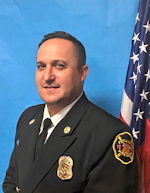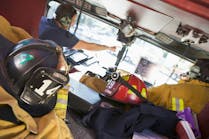The fire service officer, who is the driving force of every organization, is saddled with digesting and mastering change. Along with increases in call volume and in community needs, many things have been added to the fire officer’s scope. The service blueprint has seen an extraordinary amount of change: training in weapons of mass destruction, active shooter, natural disasters (including wildfires and flooding), paramedicine, community-based medicine and an integration of technology, including social media. All of this improves service on a daily basis. National Institute of Standards and Technology studies have changed completely organizational policies of fire attack. Flow path and the art of reading smoke make modern-day firefighters much more knowledgeable of their fire environment and provide tools to make the right tactical decision for the incident at hand. With the changes in construction and in materials that are inside of buildings, fires are growing faster, and we must adapt and learn to battle in this new environment. In truth, it has been a whirlwind of change that even the best organizations have struggled to keep up with.
At the same time, most agencies have experienced a massive turnover, so departments have had to adapt to all of these changes while having to promote younger officers. These younger officers might lack experience in life and their “slide tray “of emergency incidents.
I was one of these younger officers who was promoted and stepped right in amid this ever-changing environment. Although I had some rough days and learned some difficult lessons, in the end, I came out on top, and I’ve had a successful career. If you find yourself in the same situation, here are steps that I believe will contribute to your success.
Care
You must show that you care. Caring for your people is the single most important trait of a successful leader. You can show them that you care by getting to know them and their immediate family. Take the time to remember names and ask how things are going in their life. A successful leader of mine once told me, “The single most important job of a fire officer is to know their people.” I agree with this, and that is caring.
A successful fire officer also must be available always. That means answering emails, text messages and phone calls on your off days. When your people need you, respond and be there for them in whatever way that’s needed. I’m not implying that you never can turn work off. Of course, work-life balance is important. However, officers who never are available when they are off duty won’t have their team’s trust and will fail in showing that they care.
Make sure that you always acknowledge your crews’ success, whether it be in the firehouse or in life. Take the time to call them to check on them or to send them a text thanking them for a job well done. Acknowledgement is important for people and can go a long way in your relationship. Acknowledging successes and going out of your way to do so will pave the way to a measurable amount of success in earning respect.
Lead by example
Officers can’t earn respect by watching the team work around them. There always is a balance in this, but as a new, young officer, you must strive to be the hardest working member of the team, excluding the probationary employee, of course. Striving to be the hardest worker will be noticed and will earn respect. When you’re young and new, during work hours, lean more on the side of helping your team work and less on the side of completing your administrative duties. Save the administrative duties for the evening and late-night hours. Your crews will appreciate your assistance and will be less likely to label you as “forgetting where you came from.” That’s a label that no officer wants to have.
Humility
As an officer, you must take advantage of every opportunity that you get to “win.” Every training opportunity that you attend should be taken seriously, and you should give it your all to succeed and lead. Every fire should leave no doubt in your team’s mind that you’re intelligently and aggressively carrying out your role.
However, sometimes we “lose.” Sometimes things don’t go right, and we make the wrong decision. Whenever things don’t go right or a decision is made incorrectly, stand up and admit fault. Take responsibility when you or your team fails. Even if you believe that it might not have been your fault, it was. You must take this seriously, because you’re the leader, and your success in this career depends on it.
Once you admit a mistake or take responsibility for a loss, you must fix it. Admitting a mistake but not spelling out a solution so that it doesn’t happen again is one of the greatest faults of leaders. People see right through it and never will believe that you mean what you say.
New officers always should refrain from talking about their career success. Unless asked, no one wants to hear it. Until that respect is earned, people want to hear about how you’re working to be a better officer and leader. More importantly, do more listening then talking. The more you ask questions and listen, the more people realize that you care, and the more they will open up to you in the future. You need this open communication line to be successful inside of the firehouse and on scene.
Expectations
It’s important that a new officer sets achievable expectations.
When young and new, you want to please everyone. You want to get everything done and make sure that there never are any loose ends. However, this isn’t realistic for every shift. Officers who walk in on Day 1 and start setting unrealistic expectations won’t succeed. Your crews will see it right away and make your life more difficult than it needs to be. Setting realistic expectations and goals and striving to earn respect will, in the end, benefit and increase your production. The more that the crews respect you, the more they will sacrifice and do. So, by keeping realistic expectations, more work will get done then you might imagine.
It’s also important to avoid the hard line when it isn’t necessary. Officers who aren’t willing to meet their subordinates in the middle will struggle. Just because you have the badge doesn’t mean that you’re always right or that it always must be your way. In fact, the more that you meet people in the middle, the more respect you earn, which leads to your success. I’m not advocating that you should let people run over you, but continually drawing a line in the sand doesn’t work. Your crews will push you even harder, and, in the end, you will lose.
Adapt
New officers must get out of their office and put themselves in their subordinate’s environment. For example, I used to work with a well-respected engineer who was near to retirement. He had many more years of service than I had. This individual enjoyed spending his downtime outside. Most of the time, you would find him out back working on our yards. (He had amazing gardening skills.) If I wanted to get to know him, I had to put myself in his environment. This was to earn his respect, show that I cared and make him feel comfortable. Sitting in the captain’s office isn’t necessarily comfortable. So, I would help him with gardening and whatever else that he was doing, and we would talk. I learned a lot about life and the fire service from this member. Many years of history and lessons learned were bestowed upon me—things that I wouldn’t have learned if I stayed in front of my computer.
Continually train and educate
Unfortunately, as we promote, we tend to lose the desire to train and educate ourselves. This can be a critical failure of a new or young officer. Remember, just because you have the badge doesn’t mean that you know it all, and your crews don’t believe that you do either. Taking classes and training to improve isn’t only important because you need it, it’s to show your commitment to success. This can be particularly true when you find yourself struggling with certain parts of the job. Address it immediately, admit your fault and start training or enroll in a class to fix it. Sweeping your weaknesses under the rug almost certainly will catch up with you.
Accountability
It’s extremely important for your crews to know what’s expected of them. When things don’t go as you expected, ask yourself, “Did I do everything that I could to make sure that didn’t happen?” In addition, make sure you have all of the facts. Officers who point blame before fact-finding often find themselves apologizing later. Next, address the issues immediately at an appropriate level. Remember, most times, your crew members know when a mistake was made, so consider starting off with a conversation to see where that takes you. Just talking to people can solve more issues than not.
With all, remember to pick your battles. As a new or young officer, you’re going to be challenged and asked to have a voice for many things. Avoid falling into that trap. Try to handle things at the lowest level to identify solutions before taking the matter elsewhere. Having your crews’ back is extremely important, but fighting every little fire that arises will exhaust you and, ultimately, cause issues for you with your boss.
Lose the ego
A new, young fire service officer who can’t leave his/her ego at the door will fail. Egos lead to demise. Remember, you have worked with the people who you now lead. They know you, and the worst thing that you can do is change and walk in with an “I’m in charge” attitude. Be yourself. After all, an audition for a promotion should have started on your first day as a firefighter, so no change to your personality should be needed.
It also is important to express your leader’s intent and let them lead and win as well. Give your members opportunities to make decisions or have input. Let them lead trainings when appropriate. It isn’t all about you and your success. It’s about the team, and that means letting them be the hero and getting the recognition. Just sit back and smile, because when your crew members win, you win.
With all of the change and turnover, the fire service will continue to see young firefighters step into the officer role. This isn’t a bad thing; it can bring extraordinary drive to your agency. However, becoming a successful young officer requires patience and dedication.

Chad Costa
Chad Costa is the assistant chief for the Petaluma, CA, Fire Department. With more than 26 years of fire service experience, he has worked in various organizations, including CAL FIRE, rural and semi-rural districts, and a city. As a battalion chief, Costa was the technology and communications battalion chief. He is now a rostered operations branch director for CalFire Team 1 and an alternate operations section chief trainee on California Interagency Team 5. Costa is an accredited Chief Fire Officer through the Center for Public Safety Excellence and has a bachelor’s degree in emergency services management, a master’s degree in fire service leadership, and a certificate in homeland security. Costa has also completed the Executive Chief Officer Program at the National Fire Academy. Costa is a member of the Firehouse Editorial Advisory Board.






